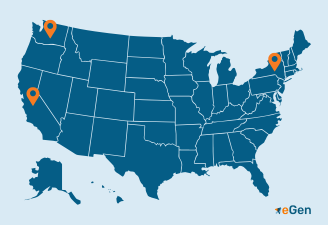State negligence laws can make or break any personal injury claim. Depending on how much your client was at fault for a car crash or slip-and-fall accident, his or her claim will be reduced, or even thrown out of court. Here are some of the best (and worst) states for personal injury negligence.
Worst: Pure Contributory Negligence
This is the bottom of the barrel for PI negligence laws. In states that have pure contributory negligence, any personal injury claimant will not be able to receive damages if he was even 1% at fault for the accident. There are only four states that follow pure contributory negligence laws in personal injury claims:
- Alabama
- Maryland
- North Carolina
- Virginia
Practicing personal injury law in one of these states is certainly more challenging than elsewhere, but by no means impossible.
Best: Pure Comparative Negligence
Pure comparative negligence means that a claimant’s settlement will be reduced by however much he or she was at fault for the accident. Even if a claimant was 99% at fault for an accident, she may still be entitled to compensation.
This is a perfect situation for attorneys taking slip-and-fall cases, one of the most common forms of personal injury claims. Even if your client was rather oblivious and slipped in a restaurant that had a clear “wet floor” sign on the premises, your client could still have a chance of receiving compensation if the restaurant was just 1% responsible for the accident. These are the states that follow pure comparative fault laws:
- Alaska
- Arizona
- California
- Florida
- Kentucky
- Louisiana
- Mississippi
- Missouri
- New Mexico
- New York
- Washington
Other States To Consider
While states with pure comparative negligence can prove to be the most valuable to attorneys, states with modified comparative negligence. In states with modified comparative negligence, the plaintiff’s damages awarded will be reduced by the percentage they were found at fault for if the fault is not 50% or 51% (depending on state laws). Should the fault exceed the state’s 50% or 51% rule, then the plaintiff will not be awarded damages. States with modified comparative negligence include:
- Arkansas (50% rule)
- Colorado (50% rule)
- Connecticut (51% rule)
- Delaware (50% rule)
- Florida (51% rule)
- Georgia (50% rule)
- Hawaii (51% rule)
- Idaho (50% rule)
- Illinois (51% rule)
- Indiana (51% rule)
- Iowa (51% rule)
- Kansas (51% rule)
- Maine (50% rule)
- Massachusetts (51% rule)
- Michigan (51% rule)
- Minnesota (51% rule)
- Montana (51% rule)
- Nebraska (50% rule)
- Nevada (51% rule)
- New Hampshire (51% rule)
- New Jersey (51% rule)
- North Dakota (50% rule)
- Ohio (51% rule)
- Oklahoma (51% rule)
- Oregon (51% rule)
- Pennsylvania (51% rule)
- South Carolina (51% rule)
- Tennessee (50% rule)
- Texas (51% rule)
- Utah (50% rule)
- Vermont (51% rule)
- West Virginia (51% rule)
- Wisconsin (51% rule)
- Wyoming (51% rule)
Unlike states with pure contributory negligence, states with modified comparative negligence still allows those who were partially at fault to receive compensation for their damages. This makes the states plaintiff friendly states and better states to practice personal injury law in.
And if You’re Stuck in DC…
If you are able to become licensed to practice in another state, or hire an attorney licensed to practice in neighboring states, you will have a lot of opportunity to supplement your personal injury practice with cases in neighboring states. Here are some great neighbors for pure contributory states:
Maryland: Pennsylvania, New Jersey, and West Virginia all follow modified 51% comparative fault, meaning your client could be equally at fault for an auto accident or slip-and-fall incident and still be able to file a claim.
Virginia: West Virginia has 51% modified comparative fault, Tennessee has 50% modified comparative fault, but the shining jewel is Kentucky: those practice in Western Virginia can hop the border to Kentucky, where the bourbon flows feely and you can file a PI claim if the defendant is just 1% at fault for an accident.
North Carolina: Similar to above—Tennessee and South Carolina use modified 50% comparative fault.
Alabama: Attorneys in Alabama have a wealth of options for taking PI claims in more favorable states. Mississippi and Florida both use pure comparative fault, while Georgia uses modified 50% comparative fault.
Increase Your PI Caseload Today
If you’d like to take personal injury leads in states with desirable fault laws, give us a call today at 617.800.0089. Our customizable personal injury packages allow you to take leads across the state, or simply in a three-digit zip prefix if you’d prefer. We’d love to discuss how you can increase your caseload with high-quality PI leads today.
Source: Comparative and Contributory Negligence Laws by State
